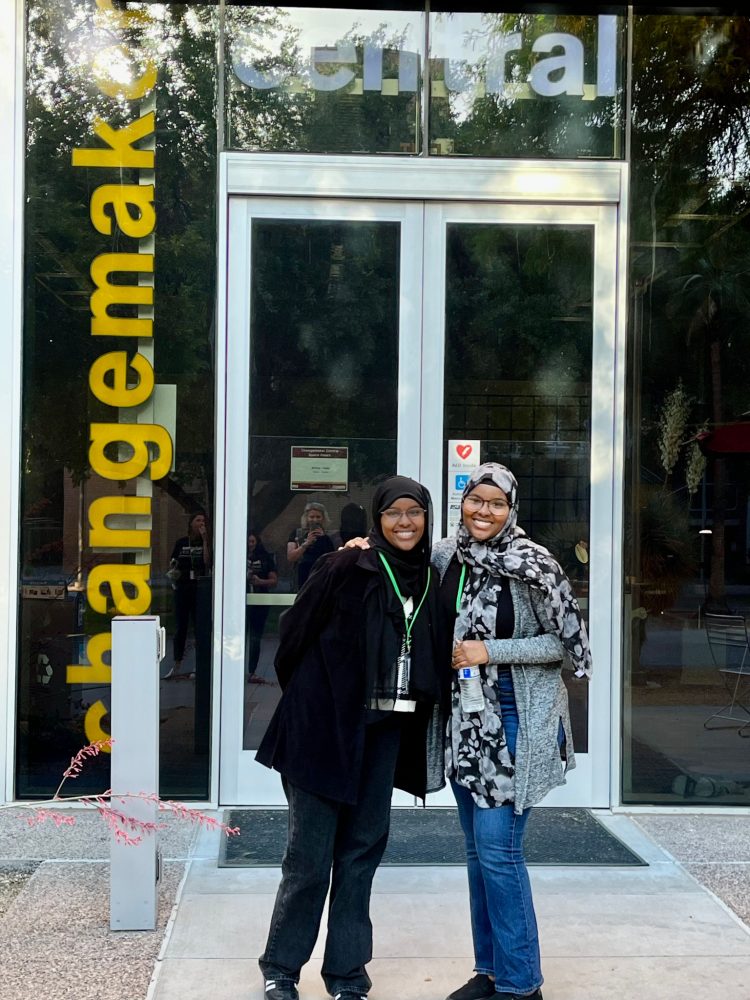“My Journey, My Family’s Journey, and My Community Have All Shaped Who I Am.”

My name is Edman Samatar, and I’m a student deeply immersed in pharmacology and toxicology, with a minor in global health—a path I share with my twin sister. My name has its own story, born out of a moment of uncertainty.
During one of my mom’s prenatal check-ups, doctors struggled to find my heartbeat. Fearing the worst, they rushed her into labor, and against the odds, I was born, alive and healthy. That day, my mother decided to call me “Lucky.” For me, it’s more than a name; it’s a reminder of life’s fragile beauty and the gratitude I carry forward every day.
Education has always been important to me, as it was to my parents. Growing up as a first-generation American, my parents instilled a respect for knowledge, not just as a tool for success but as a way to uplift others.
“Knowledge is power,” they would say, but not for selfish gain- it’s power to make a difference, to help and to share."
This belief pushed me forward, and it also ignited my passion for pharmacy. My ultimate goal is to become a pharmacist and researcher in pharmaceutical sciences, focusing on infectious diseases, particularly in underserved communities.
I first discovered my purpose when I started researching immunization rates in the refugee community. I was shocked to learn how low these rates are, partly because so many people simply aren’t given the information they need to understand vaccinations. My dad came to America as a refugee at eighteen, forced to leave Somalia when civil war tore his world apart. Eventually, he returned to marry my mom, who followed him back to the U.S. from Djibouti. The hardships they faced and the family they built inspire me every day.
Their resilience fuels my desire to support my community, especially through health advocacy for refugees who, like my parents, must learn an entirely new system and culture.
The challenges my parents faced, especially learning English in an unfamiliar world, were profound. My mom was determined to learn quickly, pushing herself to keep pace with my dad, who relied on TV to improve his language skills. Their journey here made our family close-knit and protective of one another, with a deep-rooted sense of loyalty and togetherness. They may have lost so much when they left, but they also gained something priceless: a family that would do anything to support each other.
Part of my own journey has involved giving back to our community. I started volunteering with the youth committee at my mosque, hoping to create a space where young people like me could feel comfortable discussing their experiences in America. We talk about our identities, our faith, and how to navigate challenges, which were things I struggled with alone at first. When I was younger, I didn’t have much representation or community outside my family, so I wanted to make sure others could feel seen and supported.
Wearing the hijab was a deeply personal decision for me, inspired by the women in my mosque. Watching their graceful confidence and devotion drew me to it. Choosing to wear it was one of the best decisions of my life; it’s like a filter that lets me see people for who they are. It helps me connect to my faith, reinforcing that I’m more than appearances, that my character is what truly matters. People sometimes ask questions out of curiosity, like if I shower with it on, and I don’t mind. I see it as an opportunity to educate them, to show them the beauty of my culture and faith.
My community is a supportive circle of sisters, bound not just by faith but by genuine care for one another. If someone needs help, we connect them with others who can assist. Our mosque has a lobby dedicated to supporting Muslim-owned businesses, and it’s heartwarming to see people genuinely eager to lift each other up. Here, I’ve learned that intention matters deeply. It’s a reminder not to judge others, for everyone’s on their own journey, and only God knows their true intentions.
My studies and community work have furthered my understanding of compassion, especially when it comes to issues like addiction. I’ve attended seminars on addiction, even one focused on newborns experiencing withdrawal symptoms. This fieldwork showed me how vital it is to reshape our language around addiction. Addiction isn’t a moral failure; it’s a struggle, and it’s critical to advocate for those affected. The people battling addiction aren’t perpetrators; they’re victims of circumstances, often beyond their control.
As a junior in college, I look forward to moving into pharmacy school and diving deeper into research. I’m particularly drawn to community-based clinical research, hoping to address the healthcare needs of underrepresented populations.
For me, medicine isn’t just about treating diseases; it’s about making a difference, especially for communities like mine.
My journey, my family’s journey, and my community have all shaped who I am. Being here, growing as both a student and an advocate, brings me so much fulfillment. Every step forward is a tribute to my parents’ sacrifices, my community’s resilience, and the strength of everyone who has fought for a better future. I am proud to be on this path, and I’m excited for what lies ahead.
Our team members obtain informed consent from each individual before an interview takes place. Individuals dictate where their stories may be shared and what personal information they wish to keep private. In situations where the individual is at risk and/or wishes to remain anonymous, alias names are used and other identifying information is removed from interviews immediately after they are received by TSOS. We have also committed not to use refugee images or stories for fundraising purposes without explicit permission. Our top priority is to protect and honor the wishes of our interview subjects.